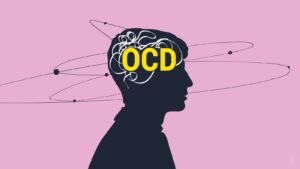Obsessive-compulsive disorder, or OCD, is a mental health condition that can cause significant problems in a person’s life. If you have OCD, you may have obsessive thoughts and engage in compulsive behaviors that interfere with your daily activities. Fortunately, some treatments can help people with OCD manage their symptoms and live productive lives. One treatment option that has shown to be effective for some people is ERP for OCD, or exposure and response prevention. In this blog, we will learn different techniques, working, and their benefits of it.
Contents
- 1 What is OCD?
- 2 What is ERP for OCD?
- 3 Techniques of ERP For OCD
- 4 How Does ERP Work For OCD?
- 5 What Are the Benefits of ERP For OCD?
- 6 What To Expect From ERP Therapy?
- 7 How to Find a Therapist for ERP For OCD?
- 8 Disadvantages of ERP Therapy For OCD
- 9 Tips To Keep On Mind While Using ERP for OCD
- 10 Alternatives to ERP for OCD
- 11 Conclusion
What is OCD?
 OCD, or Obsessive Compulsive Disorder, is a mental health condition that affects approximately 1 in 100 people. OCD is characterized by compulsions, which are repetitive behaviors or thoughts that a person feels matter to relieve anxiety or prevent something bad from happening, and obsessions, which are persistent and intrusive thoughts, impulses, or images that are unwanted and cause distress. People with OCD often recognize that their thoughts and behaviors are irrational, but they feel unable to control them.
OCD, or Obsessive Compulsive Disorder, is a mental health condition that affects approximately 1 in 100 people. OCD is characterized by compulsions, which are repetitive behaviors or thoughts that a person feels matter to relieve anxiety or prevent something bad from happening, and obsessions, which are persistent and intrusive thoughts, impulses, or images that are unwanted and cause distress. People with OCD often recognize that their thoughts and behaviors are irrational, but they feel unable to control them.
There are many different types of OCD, but some common themes include fear of contamination or germs, fear of losing things or harming others, excessive concern with symmetry or orderliness, and repetitive Doubting or checking behaviors.
While OCD can be a very debilitating condition, there are treatment options available that can help people manage their symptoms and live productive lives. Some common treatments for OCD include cognitive behavioral therapy (CBT), medication, and exposure and response prevention (ERP).
CBT for OCD typically involves helping the person identify and challenge their distorted beliefs about their compulsions and obsessions. Medication can also be effective in treating OCD, particularly serotonin reuptake inhibitors (SRIs).
What is ERP for OCD?

If you have OCD, you know that your thoughts and behaviors can be extremely time-consuming and disruptive. ERP is a type of therapy that can help you manage your OCD by learning to respond to your thoughts and trigger differently way. During ERP, you’ll work with a therapist to identify your specific OCD triggers and develop a plan for how to respond to them.
This might involve gradually exposing yourself to your trigger (with the help of your therapist) and learning not to engage in your usual compulsions or avoidance behaviors. ERP can be a difficult process, but it can be extremely effective in helping you manage your OCD and improve your quality of life.
Techniques of ERP For OCD

ERP therapy, or Exposure and Response Prevention therapy, is a type of treatment that helps people with OCD manage their anxiety by gradually exposing them to the things they fear and teaching them healthy coping mechanisms. In this article, these are some of the techniques that ERP therapists use to help their patients.
Cognitive Restructuring
This is a type of therapy that helps people with OCD to identify and challenge their negative thoughts. This can be done by teaching them how to recognize their thoughts, question them, and come up with more realistic and positive alternatives.
Exposure Therapy
This is a type of therapy that involves exposing people with OCD to the things they fear in a controlled and safe environment. This exposure can be done in small steps so that it does not overwhelm the person. The therapist will also help the person to manage their anxiety during exposure therapy.
Response Prevention
This is a type of therapy that teaches people with OCD healthy coping mechanisms to deal with their anxiety. This can involve learning how to relax, using breathing exercises, or learning how to distract oneself from negative thoughts.
How Does ERP Work For OCD?
 There is a lot of misinformation out there about how ERP works for OCD. The truth is, it can be an extremely effective treatment for those who suffer from the disorder.
There is a lot of misinformation out there about how ERP works for OCD. The truth is, it can be an extremely effective treatment for those who suffer from the disorder.
ERP, or exposure and response prevention, is a type of cognitive behavioral therapy that focuses on helping people manage their OCD by facing their fears and learning to respond more healthily way.
For many people with OCD, the thought of facing their fears can be extremely daunting. However, with the help of a trained therapist, ERP can be an incredibly powerful tool for managing the disorder.
During ERP therapy, people with OCD will work with their therapist to gradually face their fears in a safe and controlled environment. They will learn how to cope with their anxiety and eventually come to a place where their OCD no longer controls their lives.
If you or someone you know suffers from OCD, please don’t hesitate to seek out professional help. ERP can be an incredibly effective treatment for those who are willing to put in the work.
What Are the Benefits of ERP For OCD?

There are many benefits of ERP for OCD, including:
1. Increased Awareness: One of the key benefits of ERP is that it helps people with OCD to become more aware of their thoughts and behaviors. This increased awareness can lead to better control over OCD symptoms.
2. Improved Ability to Control Thoughts and Behaviors: ERP can help people with OCD learn how to control their thoughts and behaviors. This can lead to fewer and less severe OCD symptoms.
3. Greater insight into OCD: ERP can help people with OCD to gain a greater understanding of their disorder. This insight can help people with OCD to develop more effective coping mechanisms for dealing with their symptoms.
4. Enhanced Quality of Life: Ultimately, ERP can help people with OCD improve their quality of life. This may involve reducing the frequency and severity of OCD symptoms, as well as improving work, social, and family functioning.
What To Expect From ERP Therapy?
If you are considering starting ERP therapy, you may be wondering what to expect. This type of therapy can be very effective for treating OCD, but it is important to understand what it entails before beginning. Here is an overview of what you can expect from ERP therapy:
1. The therapist will work with you to identify your specific OCD triggers.
2. You will then be asked to deliberately expose yourself to these triggers (under the supervision of the therapist, of course).
3. This exposure will help you to learn how to better manage your anxiety and cope with your OCD symptoms.
4. The therapist will also provide you with tools and techniques that you can use on your own to continue progressing in your treatment.
ERP therapy can be difficult, but it is often very successful in treating OCD. If you are willing to put in the work, you can expect to see significant improvements in your symptoms.
How to Find a Therapist for ERP For OCD?
ERP therapy is a type of therapy that can be used to treat various mental disorders, such as OCD. If you or someone you know is struggling with OCD, you may be wondering how to find a therapist who specializes in ERP therapy. Here are a few tips:
1. Talk to your doctor or another mental health professional. They may be able to recommend a therapist who specializes in ERP therapy.
2. Look for a therapist who is certified in cognitive behavioral therapy (CBT). This type of therapy is effective in treating OCD.
3. Ask friends or family members if they know of any therapists who specialize in ERP therapy.
4. Search online for therapists who specialize in ERP therapy. Once you find a few potential therapists, give them a call and ask about their experience with treating OCD.
Disadvantages of ERP Therapy For OCD
However, some potential drawbacks should be considered before beginning treatment.
One potential downside of ERP therapy is that it can be emotionally challenging. The exposure component of the treatment can be very anxiety-provoking, and it may take some time to adjust to the idea of deliberately triggering your symptoms. Additionally, the process of learning to control your anxiety response can be difficult, and it may take some time and effort to master the techniques involved.
Another potential downside of ERP therapy is that it requires a significant commitment of time and energy. The exposure component of the treatment often requires multiple sessions per week, and each session can last several hours. This can be challenging for people who have busy schedules or who live far from their therapist.
Tips To Keep On Mind While Using ERP for OCD
These are some of the tips to keep in mind while using ERP for OCD:
1. Give clear and specific instructions: When using ERP for OCD, it is important to give clear and specific instructions to the individual. This will help to avoid any confusion or misunderstanding during the process.
2. Be consistent: It is also important to be consistent with the application of ERP for OCD. This means using the same techniques and procedures each time the individual is exposed to the feared object or situation.
3. Be patient: The process of exposure and response prevention can be slow and challenging. It is important to be patient and understand that progress may not happen immediately.
4. Have realistic expectations: It is important to have realistic expectations when using ERP for OCD. This treatment requires hard work and dedication from both the individual and the therapist. There is no guarantee that every fear will be eliminated, but significant improvements are often seen with treatment.
Alternatives to ERP for OCD
 Many different techniques can be used to help treat OCD, and not all of them involve using ERP. Here are a few other options that you might want to consider:
Many different techniques can be used to help treat OCD, and not all of them involve using ERP. Here are a few other options that you might want to consider:
- Cognitive behavioral therapy (CBT): This type of therapy can help you change the way you think about your obsessions and compulsions, which can make them less severe.
- Medication: Several different types of medication can be used to treat OCD, including antidepressants, anti-anxiety medications, and antipsychotics.
- Natural remedies: Some people find that certain natural remedies, such as herbal supplements or acupuncture, help to ease their OCD symptoms.
Conclusion
There is no one-size-fits-all approach to treating OCD, but ERP can be an effective treatment for many people. If you or someone you know is struggling with OCD, talk to a mental health professional about whether ERP might be right for you.
Many different techniques can be used to help manage OCD symptoms, but not all of them will work for everyone. If you’re struggling to find a technique that works for you, talk to your doctor or therapist about other options. Remember, you’re not alone in this — some people care about you and want to help you get better.
Hope this article was of help to you! If you are suffering from OCD, you may seek help from Therapy Mantra. We have a team of highly trained and experienced therapists who can provide you with the tools and skills necessary for overcoming OCD. Contact us today to schedule an online therapy or download our free OCD treatment app on Android or iOS for more information.


